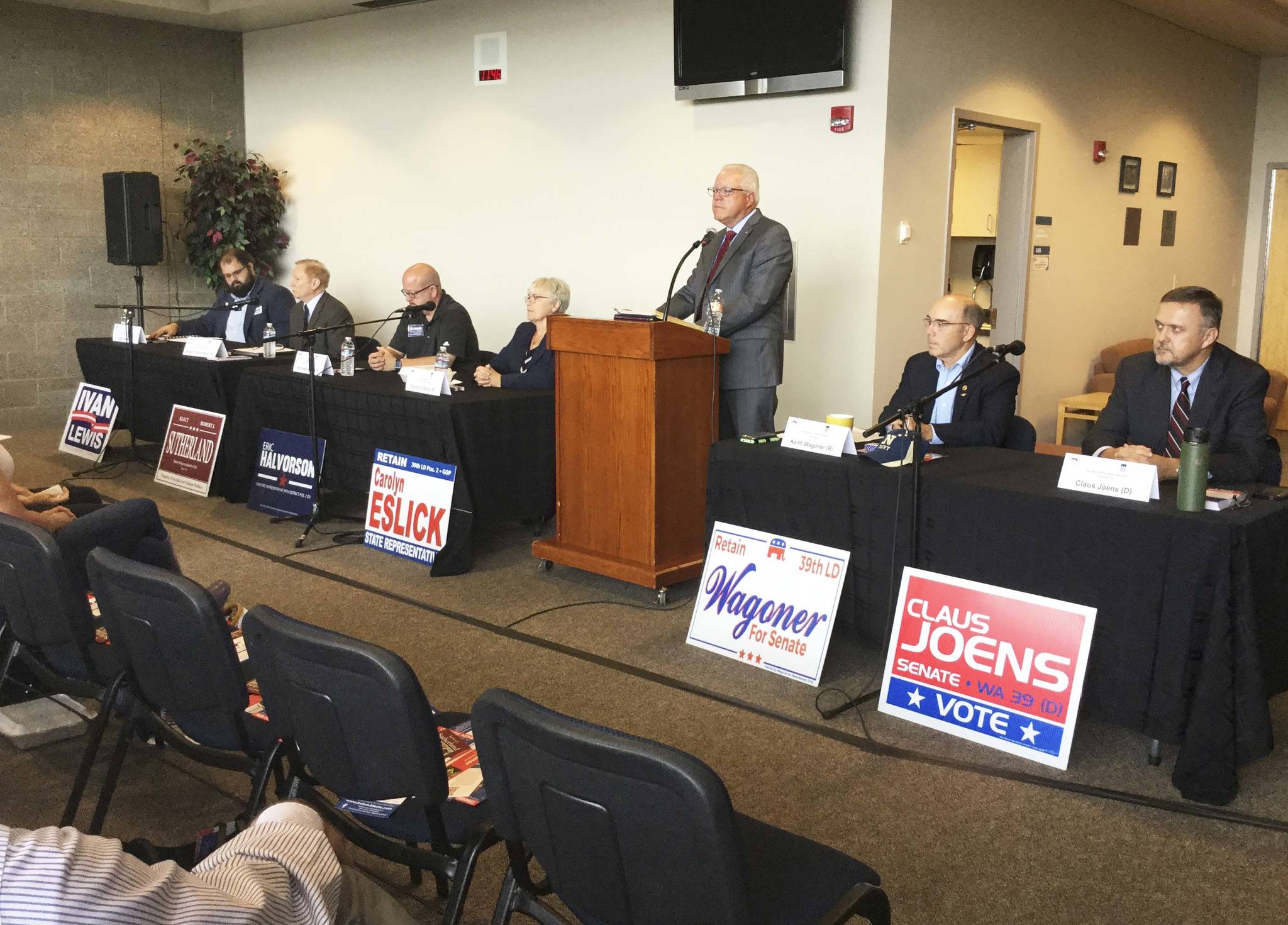ARLINGTON – Candidates running for three contested seats in the 39th Legislative District shared their views on transportation, education and other key issues with a business crowd Tuesday.
Among the candidates, two appointed Republicans are seeking to retain their legislative seats against Democratic party challengers, and a second house seat is up for grabs after Rep. Dan Kristiansen announced earlier this year that he would not seek re-election.
Sen. Keith Wagoner, R-Sedro Woolley is facing Claus Joens, a Democrat from Marblemount. In the house Pos. 2 race, Rep. Carolyn Eslick, R-Sultan seeks to retain her seat against challenger Eric Halvorson, D-Monroe, while Startup Democrat Ivan Lewis and Monroe Republican Robert Sutherland are jockeying to fill the vacant Pos. 1 seat.
The Marysville Tulalip and Stillaguamish Valley chambers of commerce partnered to host the forum, which was held in the Byrnes Performing Arts Center at Arlington High School.
The 39th District cover eastern Snohomish and Skagit counties, and northern King Council.
Wagoner had a firm grasp of geography in the large district that tends to see more focus in Skagit County on issues such as property rights and wildlife. In populous Snohomish and King counties in the south, transportation is the big issue, with affordable housing and the opioid epidemic also prominent.
At the top of his transportation wish list is fixing state highways – 2 and 9 – and starting with the most-maligned drive among them, 522.
“Fix SR 522 first,” said Wagoner, the former Sedro-Woolley mayor and Navy commander. “That has been an absolute failure of government. Kids aren’t getting to school on time.”
Traffic congestion and delays are wearing on families and short-changing learning that should be happening. As a solution, Wagoner suggests reallocating tax dollars where they will do the most good, for things like more lanes and mass transit, even if that means taking from bike lanes and trails.
His challenger, Joens, a Career and Technical Education teacher, said the district’s largest issue if finding money to fund work that needs to be done by government, without raising taxes on poor and working families.
“Close most of the seven hundred tax loopholes other than those that benefit the poor or retired on fixed incomes,” Joens said. “Not everyone is sharing in the profits” that corporations are generating.
Eslick agreed with Wagoner that transportation is a huge issue. She also singled out the mental health crisis as another key issue because demand for beds and treatment services is outpacing supply, and mental health is intermingled with so many other current social issues that lawmakers are trying to address through more funding.
“I don’t think our money is being spent well yet,” said Eslick, a former Sultan mayor and businesswoman. She does support local solutions like the Arlington Community Resource Center to support Oso slide victims and families, and mental health services in the schools.
Her challenger, Halvorson, an accountant and rescue farmer, said transportation ranks high on his priority list, too, most notably to make 522 a four-lane highway. While out door-belling, his constituents have focused more on taxes and education.
For the Position 1 candidates, Lewis and Sutherland put health care, family and kids ahead of transportation infrastructure.
Lewis, volunteer firefighter and EMT and hobby farmer, said better health care, preferably universal, would make health care more affordable for families, and make it easier to shift resources to the next more important issues, such as battling the opioid epidemic.
Sutherland, a retired biochemist and Air Force veteran, said addressing major issues begins with children and giving parents more educational choices – private, home school and religious school, for example.
“I would like to see more dollars go that direction,” Sutherland said. The results will mean higher graduation rates, less crime and drug abuse, and a better community.
The candidates were also asked about economic development and the business climate.
Wagoner said economic development is happening, and it’s going to keep coming.
“We need to get out of the way and let business do its thing,” Wagoner said.
When the local job market grows, the good news is people don’t have to travel, thus reducing commuter congestion, he said. However, he added, having affordable housing is part of the formula, too.
Sutherland agreed on affordability, with a caveat. “The problem I see is we are building a lot of housing, but not more schools and roads. This has to be better coordinated.”
Eslick said the district is doing a good job attracting economic development, which wasn’t the case 10 years ago.
There is more job and workforce training. A North County Training Center is in the offing for the electricity, plumbing and other trades to get young adults onto a vocational career track paying family-wage jobs that they may not have considered.
Joens said in addition to his priority to close corporate tax loopholes, “Simplify business regulations and taxes to promote new jobs.”
The candidates were no fans of the business and occupation tax, viewing it as a hindrance to business growth.
Wagoner singled out Initiative 1631, the carbon tax on fuel statewide, as another policy that would have serious consequences for the economy if voters approve it.
It’s not a formula to calculate costs of climate change into the price of fossil fuels. It’s a formula for crippling industry and agri-business.
The initiative is a “great disservice to farmers,” he said.



